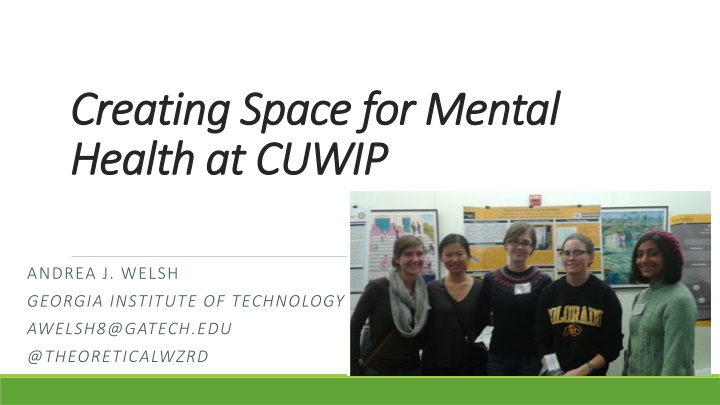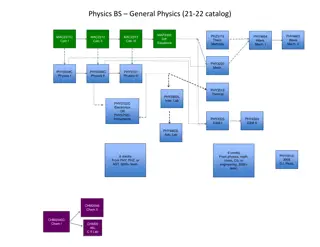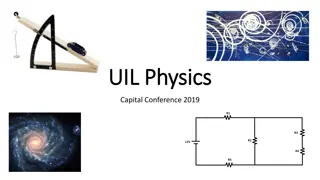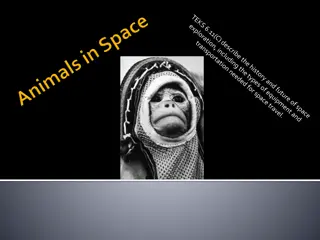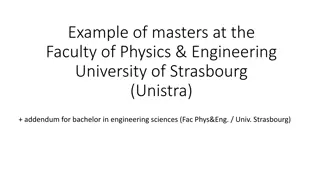Creating Space for Mental Health: Empowering Women in Physics
Conferences for Undergraduate Women in Physics (CUWIP) create a supportive space for women pursuing physics degrees. This initiative addresses mental health struggles among students, providing resources and encouraging open conversations. From personal experiences to organizing sessions, the impact of prioritizing mental well-being in academic environments is evident. Join the movement towards destigmatizing mental health challenges and empowering students in the field of physics.
Download Presentation

Please find below an Image/Link to download the presentation.
The content on the website is provided AS IS for your information and personal use only. It may not be sold, licensed, or shared on other websites without obtaining consent from the author.If you encounter any issues during the download, it is possible that the publisher has removed the file from their server.
You are allowed to download the files provided on this website for personal or commercial use, subject to the condition that they are used lawfully. All files are the property of their respective owners.
The content on the website is provided AS IS for your information and personal use only. It may not be sold, licensed, or shared on other websites without obtaining consent from the author.
E N D
Presentation Transcript
Creating Space Creating Space for Health at CUWIP Health at CUWIP for Mental Mental ANDREA J. WELSH GEORGIA INSTITUTE OF TECHNOLOGY AWELSH8@GATECH.EDU @THEORETICALWZRD
Conferences for Undergraduate Women in Physics (CUWIP) Organized through APS with a national committee Multiple regional sites host them simultaneously Reaches most women who get bachelor degrees in physics in the US Consists of multiple breakout sessions that students can choose topics to attend Sessions tend to be small groups 5-30 students Sessions often range from different physics areas, physics careers, and diversity discussions
Motivation: My first CUWIP in 2009- Yale University Had a history of depression & anxiety (& ADHD?) Was not getting treatment Spent third of the conference not able to concentrate on the talks Spent third anxious about not following along and trying to tALK with PeoplE?? Spent third feeling bad for not talking with people and not being able to pay attention thinking that none of the women speaking probably had these issues, and because I did, I would never get to their point Didn t go back until 2015 (before which, I started regularly doing group/individual counseling and had been on anti- depressants/anti-anxiety meds)
2016: Chairing a CUWIP Conference What would 2009 me wish I saw? Our conference website FAQ section: Response: National committee found it unique, graduate students contacted me saying they were grateful and thanked me, undergraduates brought up their mental heal concerns in their applications
Depression and Anxiety: Dealing with Mental Health While in School Would people be interested? Yes! About 30 students signed up in pre-conference survey, ~30 attended (standing room only) of ~200 attendees even with 10 workshop options available How would I run it? GT Counseling Center representative will talk about mental health basics Personal self-care tips (eating right, exercising, scheduling breaks, seeing a doctor, medication) Resources that can be found on and off campus What you can do if it gets overwhelming (drop a class, switch to pass/fail, incomplete, take a semester off) I would also speak a little about my mental health What are some lasting effects? Students felt more open talking about it, not a taboo --> more likely to get seek out resources Other CUWIPs took it back to their conferences
2017 CUWIP Sites with a Mental Health Workshop Rice University: Mental Health: Handling Stress Representative from Rice Counseling Center held a presentation Student s sharing experiences the knowledge that I am not alone. Everyone there really came together to offer advice, support, and affirmation that stress, depression, and anxiety are real challenges that we face as undergraduates in physics McMaster University: run by Working Improv Destress techniques, Thai Chi One of the most popular workshops, 30 signed up, even more attended Some students critical of lack of resources and discussion of serious mental health concerns Princeton University: Mental Health University of Colorado Boulder: Managing Mental Health In addition to these sites, Virginia Tech and Montana State all added the FAQ
Other Conferences: 6th Annual oSTEM Conference in Denver, Colorado, 2016:
What Else Can be Done? More open conversations about mental health in an our of the classroom (statements on syllabi, websites, etc) Make resources, especially those on campus, easily available students Hold workshops for students through campus counseling centers Make educators more aware about the effects of mental health, possibly through training Other suggestions?
Organized session on working with Autism Simonetta Luiti AAS, Working Group on Accessibility and Disabilities JED Foundation, protect emotional health and prevent suicide for our nation s teens and young adults
Resources National Suicide Prevention Lifeline 1 800 273 8255 Campus counseling centers (often free, but in high demand, check available options) Local off campus centers (often cost $) Suicide Prevention Resource Center Online training courses JED Foundation ULifeline online resource for college mental health National Alliance on Mental Illness
